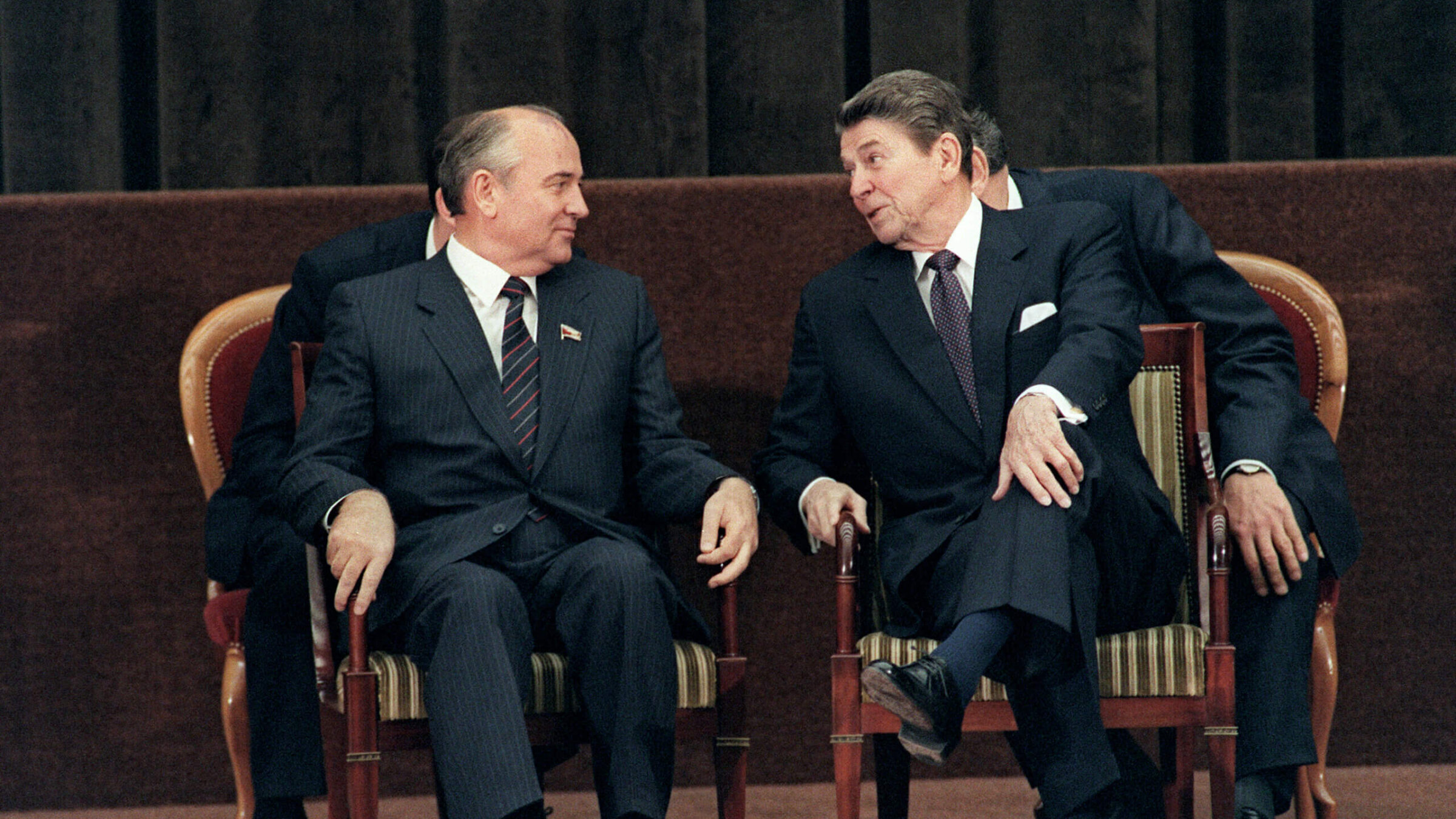My parents were refuseniks. Mikhail Gorbachev made our life in the U.S. possible
Rina Shamilov’s parents and grandparents spent years trying to leave the Soviet Union. Gorbachev, who died this week at 91, gave them the freedom to do so.

Former American president Ronald Reagan and former Soviet president Mikhail Gorbachev during the Geneva summit. Photo by AFP via Getty Images
“I was afraid of the unknown and that I would never see my parents again,” my mother said. “But coming to America meant that my children would grow up in a safe place.”
The story of how my family came to the United States began in 1985, when Mikhail Gorbachev, the former Soviet leader who died Tuesday at 91, met with President Reagan in Geneva. During that summit, Reagan encouraged Gorbachev to ease the Soviet Union’s emigration policies and allow more Soviet citizens to, if they wished, pursue lives elsewhere.
Their meeting laid down the blueprint for a small set of Soviet citizens — some of them Jews — to depart for other countries. Under the agreement they formed, Soviets known as “Otkazniki,” or “refuseniks” — who were for many years prohibited from leaving despite their applications to do so — were given higher preference in being allowed to emigrate. People with family abroad were put at the top of the list to be granted permission to leave.
My family was part of that group, and became one of the first to leave the Soviet Union. Gorbachev’s work paving the way for our family to leave made him a hero to us. As my mother said, it meant “that my family and kids had the opportunity to escape a painful reality.” Three decades later, the monumental significance of his intervention in our lives still feels fresh.
“Two years after Gorbachev’s visit to Geneva, my father-in-law’s brother gained entry,” my mother said — my paternal great-uncle. A year after that, in 1988, my parents and two older brothers received permission to leave. After traveling through Austria and Rome with the help of Sahnut, a Jewish immigration organization that helped Russian Jews leave the Soviet Union, my family settled in Brooklyn, where, years later, I was born.
My family were refuseniks for 15 years before Gorbachev opened the doors for us to leave. My paternal grandfather, Don — we call him “Dedushka,” which means “grandfather” in Russian — had wanted to leave the Soviet Union for Israel since 1973. Living in Nalchik, near Chechnya, he felt that the Soviet regime posed a serious threat to Jewish people in his region.
Dedushka’s younger sister, Raya, was allowed to leave in 1973 because she didn’t have any registered political affiliations. But Dedushka and his brother were denied the same permission, although they had applied for it, because they were both registered Communists privy to classified information.
After Raya’s emigration to Israel split up the family, my grandfather applied for permission to leave every six months for a decade. He was denied each time. “There was constant written communication between them even though she left,” my mother said. “They even sometimes spoke on the phone.” But Raya’s letters were almost always open when they arrived because “the government was tracking what was being said,” my mother said.
When my parents were finally approved to emigrate, my mother was excited by the opportunity to leave a country she hated. She lived her life hiding a lot of her religious identity because the Communist regime rejected her faith.
What scared her was leaving her parents behind. While Dedushka emigrated with my parents, my mother’s parents had not received the same permission to leave — a reminder that while Gorbachev’s efforts had opened new horizons for many Soviet Jews, there were still many left behind. My maternal grandparents were virtually stuck in Russia. As my mother prepared to leave, she wondered what the future might hold for them.
“What if I would never be able to see them again?” she said. “The fear ate at me.”
Life in America wasn’t easy. For her and my father, making a living to support our family was challenging. She stayed focused on the future: “It was very hard,” she said, but she felt “that I had to achieve something for my children’s sake.”
My maternal grandparents ended up migrating to Israel in 1992. I wish I had gotten the chance to grow up with them, but we talk to them regularly and visit as often as we can.
Today, my mother remains grateful to Gorbachev for all that he did.
“I believe that he was a nice man,” she cheerily told me. “He opened opportunities for people to reunite with their families. He helped people like me, people who lost hope.”
A message from our CEO & publisher Rachel Fishman Feddersen
I hope you appreciated this article. Before you go, I’d like to ask you to please support the Forward’s award-winning, nonprofit journalism during this critical time.
We’ve set a goal to raise $260,000 by December 31. That’s an ambitious goal, but one that will give us the resources we need to invest in the high quality news, opinion, analysis and cultural coverage that isn’t available anywhere else.
If you feel inspired to make an impact, now is the time to give something back. Join us as a member at your most generous level.
— Rachel Fishman Feddersen, Publisher and CEO